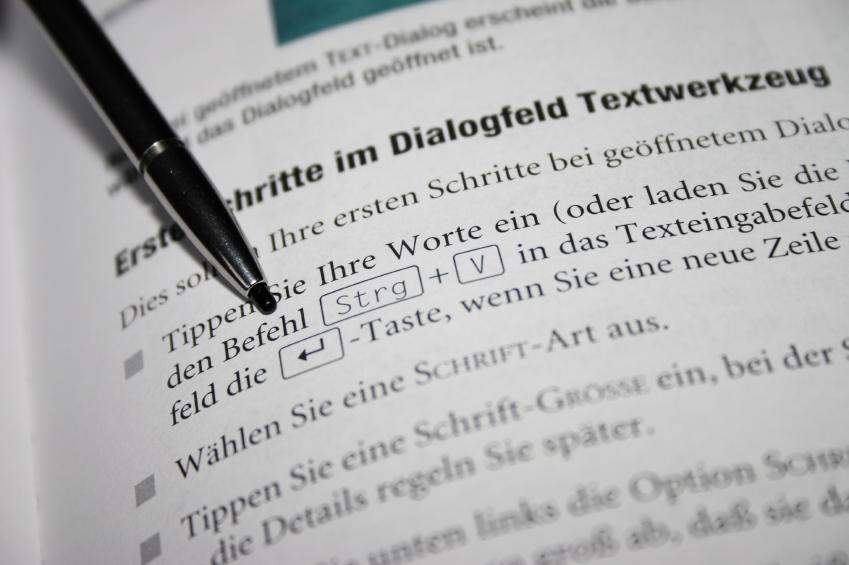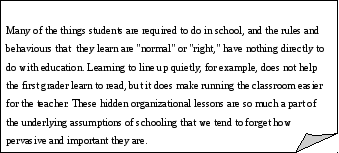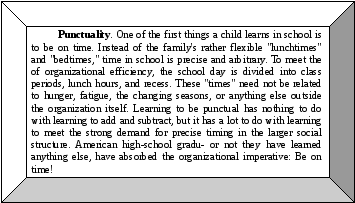
- •Міністерство освіти і науки україни
- •Мета навчання англійської мови студентів гуманітарних спеціальностей
- •What’s your learning style?
- •Sociology reinterpreted
- •Vocabulary
- •Task 7. Fill in the correct words from the previous exercise into the gaps below (not all words are needed).
- •In this unit we make review of Tenses, for more information see Reference 1
- •Begin with: c Have youused any expressions from the text in your summary?written 10 sentences?checked your spelling?checked punctuation and grammar?heck your work
- •Analysis of questionnaire
- •Let’s play the no-no game
- •The ethics of research
- •Vocabulary
- •Task 6. Fill in the correct words (not all words are needed) from the previous exercise into the gaps below.
- •In this unit we make review of Relative clauses, for more information see Reference 2
- •Forming a hypothesis
- •Interpreting the data
- •Begin with:
- •Vocabulary Task 4. Chose the best headline a-h for each paragraph 1-8 (All the headlines will be used).
- •Task 6. Fill in the correct words from the previous exercise into the gaps below (not all words are needed).
- •In this unit we make review of Passive Voice, for more information see Reference 3
- •A: company president b: sales clerk
- •C Have youused any expressions from the text in your summary?written 10 sentences?checked your spelling?checked punctuation and grammar?heck your work
- •Answers to quiz
- •Economy: historical overview. Social inequality
- •Vocabulary
- •Task 7. Fill in the correct words from the previous exercise into the gaps below (not all words are needed).
- •In this unit we make review of the Articles, for more information see Appendix 4
- •Idea, European, expensive project, thousand times, mp, economic crisis, ewe, honest decision, mba, academic year, yearly chart, honourable person, university, euphemism.
- •Views on inequality
- •1. I stay late at the office:
- •2. Regarding my job, my friends and family say:
- •3. I miss events with my family and friends due to work:
- •4. I find myself doing work tasks outside of the office:
- •5. If I need to take personal time off of work (for a doctor’s appointment or another personal obligation):
- •Time, work and leisure
- •Task 6. Fill in the correct words (not all words are needed) from the previous exercise into the gaps below.
- •In this unit we make review of Clauses, for more information see Appendix 5
- •Social movements and social conflicts
- •Vocabulary
- •Task 7. Fill in the correct words from the previous exercise into the gaps below (not all words are needed).
- •In this unit we make review of Reference words,For more information see Appendix 6
- •Begin with c Have youused any interesting expressions from the text in your summary?written 10 sentences?checked your spelling?checked punctuation and grammar?heck your work
- •Study skills answers
- •Education and equality
- •Vocabulary
- •Task 6. Fill in the correct words from the previous exercise into the gaps below (not all words are needed).
- •In this unit we make review of adjective, for more information see Appendix 7
- •Begin with: c Have youused any new expressions from the text in your summary?written 10 sentences?checked your spelling?checked punctuation and grammar?heck your work
- •The name game
- •Ideas are plants
- •Vocabulary
- •Task 7. Fill in the correct words from the previous exercise into the gaps below (not all words are needed).
- •In this unit we make review of Inversion, for more information see Reference 8
- •Begin with: c Have youused any interesting expressions from the text in your summary?written 10 sentences?checked your spelling?checked punctuation and grammar?heck your work
- •Suggested answers to task 2
- •Saving lives through social action
- •Vocabulary
- •Task 6. Fill in the correct wordsfrom the previous exercise into the gaps below (not all words are needed).
- •In this unit we make review of Reported Speech, for more information see Appendix 9
- •Are is has live can can’t will were was had lived could won’t would
- •Begin with: c Have youused any expressions from the text in your summary?written 10 sentences?checked your spelling?checked punctuation and grammar?heck your work
- •Unit 10
- •The seven rules of rhetoric
- •Vocabulary
- •Task 6. Fill in the correct words from the previous exercise into the gaps below (not all words are needed).
- •In this unit we continue review of Inversion and start review of Emphasis, for more information see Reference 10
- •Begin with: c Have youused any interesting expressions from the text in your summary?written 10 sentences?checked your spelling?checked punctuation and grammar?heck your work unit 11
- •How ambitious are you?
- •1. In ten years do you hope to:
- •2. In twenty years' time do you hope to:
- •Why marriage?: the universal functions of the family
- •Vocabulary
- •Task 6. Fill in the correct wordsfrom the previous exercise into the gaps below (not all words are needed).
- •In this unit we make review of Conditionals, for more information see Appendix 11
- •Begin with: c Have youused any interisting expressions from the text in your summary?checked your spelling?used any Conditionals?heck your work
- •Unit 12
- •Men versus women quiz
- •3. A study has found women are more sensitive to male body odours than vice versa because…
- •4. Studies have shown that women feel more pain than men. What is not a reason for this?
- •8. Pick the incorrect answer from these research findings about heterosexual infidelity…
- •Answers
- •1. Answer: c) Roughly the same amount, 16,000 words per day.
- •3. Answer: b) Women can detect body odour better than men when the smell is being disguised.
- •4. Answer: c) Women have fewer nerve receptors than men causing them to feel pain more acutely.
- •5. Answer: d) All of the above.
- •6. Answer: d) Gay men use a mixture of male and female navigating techniques.
- •7. Answer: b) Women use parts of their brain involved in language processing more than men to decipher jokes.
- •8. Answer: a) Women were more likely to believe that men have sex when they are in love.
- •9. Answer: b) It's a cultural belief, standardised testing shows no gender differences in maths performance.
- •10. Answer: c) As a member of a predominantly monogamous species men invest more energy in relationships.
- •Masculinity and femininity: socialized differences
- •Vocabulary
- •In this unit we make review of Gerund/Infinitive, for more information see Appendix 12
- •1. Breaking the speed limits is regarded by men as a minor offence.
- •Unit 13
- •Social control
- •Vocabulary
- •Task 6. Fill in the correct wordsfrom the previous exercise into the gaps below (not all words are needed).
- •In this unit we make review of Modal Forms, for more information see Appendix 13
- •1. Deviance should be defined as violation of expected rules and norms.
- •4. Аномальність має бути розглянута з точки зору групових інтересів.
- •Begin with: c Have youused any interesting expressions from the text in your summary?checked your spelling?used any Modal forms?heck your work
- •Grammar reference
- •Relative clauses
- •Passive voice
- •Articles
- •Clauses
- •Reference words
- •Adjective
- •Inversion
- •Reported speech
- •Emphasis
- •First Conditional: real possibility
- •Infinitive
- •The modals table
- •Literature
G
In this unit we make review of adjective, for more information see Appendix 7
RAMMAR

Task 13. Fill in each gap with an adjective in the correct form. Pay attention to the rules of the comparison of the adjectives.
Learning to be punctual has nothing to do with learning to add and subtract, but it has a lot to do with learning to meet the strong demand for precise timing in the ______ (large) social structure.
In every school the "leading crowd," or _________(high) status group, had twice as many athletes and many more popular boys than it had brilliant students.
Family background is still____________(important) factor in educational achievement.
Kahl discovered that these parents tended to be dissatisfied with their own jobs and anxious to have their sons do ______(good) than they had.
________ ( successful) students have usually learned not only to obey the rules but to please their superiors by anticipating their demands, or "giving teachers what they want."
Task 14. Fill in the gaps with the correct preposition from the box.
|
in about with of for |
1. Working-class students are sometimes jealous _____ middle-class students.
2. While mastering the subject is certainly most important, grades can also be improved by being on time, obeying the rules, and acting interested _________what the teacher is saying.
3. The family and organized religion were responsible _______ education in pre-industrial times.
4. Working-class parents tended to be dissatisfied_____ their own jobs and anxious to have their sons do better than they had.
5. People who are worried_______ their background have fewer chances than those who do not think about it.
Task 15. Match each word on the left to the word on the right with an opposite meaning. Make up sentences using these adjectives.
|
|
Task 16. There is an extra word in each of the sentences below. Find an adjective in each sentence.
However, most on children know the second lesson of the hidden curriculum: Do as you're told!
Middle-class children use more correct grammar and develop proper manners.
Compared these with the influence of different family backgrounds, the school itself appears to have little effect on how well students perform in school.
The increasing demand for educated workers in an industrial society, the growth of bureaucracy, democratic idealism, except all these cultural and social factors intertwined the educational system with other institutions in society.
In 1964 the Office of Education commissioned a very famous research report on educational opportunity by the sociologist James Coleman.
Task 17 Complete the asterisked gaps in the chart below with words from the paragraphs indicated. Then fill the other gaps.
|
PARAGRAPH |
NOUN |
ADJECTIVE |
VERB |
|
§ 1 |
* |
influential |
|
|
§ 2 |
* |
|
encourage |
|
education |
* |
| |
|
|
* |
valuable |
|
|
§ 3 |
* |
|
equal |
|
* |
|
perpetuate | |
|
§ 4 |
need |
|
* |
|
* |
educational |
|
Task 18. Write the correct person’s name under the adjective that best describes him or her.
|
There’s no point in arguing with Bruce. He won’t listen to the opinions of others, even if they prove him wrong.
As the headmaster of the school, Carol has to be able to do many different things. In addition to her regular duties, she’s also the accountant and hiring manager.
Victor takes care when making decisions in order to avoid unnecessary risk.
Students love Randy because he’s relaxed. He doesn’t mind if his students are late and he gives them a lot of freedom.
Robert, the new headmaster, fired four teachers in his first week. He’ll do whatever he has to reduce costs.
Patricia works hard and she makes an effort to do her tasks well.
Fresh out of university, Tanya, was excited about getting started with her job and learning new things.
Mike is very helpful. He’s always willing to be of assistance to the other members of the class. |
easygoing ____________
prudent ____________
diligent ____________
stubborn ____________
eager ____________
ruthless ____________
cooperative ____________
versatile ____________
|
Task 19. Rearrange these words to form sentences, and translate them into Ukrainian.
1. and / values / their / peer / the /group / learn / of important / students / attitudes/ more/
2. works / how / the / people / curriculum / the / system / how / demands / the / and / school / deal / other / formal / of / young / each / teach / with to /
3. all / from / textbooks / not / learn / just / situation / their / from / the / of / lessons / aspects / school / these / students /
4. were / adolescent / the / these / of success / deterrent / the / Coleman / that / values / results / suggested / to / a subculture / to academic /
5. and / values / not / also / are / teach / in / and / curriculum / formal / that / students / administrators / the attitudes / school's / teachers/
Task 20. Find at least 10 adjectives in the text you have read.
TRANSLATION
Task 21 Translate the following paragraph into Ukrainian, pay attention to use of adjectives.

Task 22. Choose the best option to translate the sentences.
1. Education is the formal transfer of knowledge, skills, and values from one person or group to another.
A. Освіта – це набуті знання, навички та цінності.
В. Освіта – це формальна передача знань, навичок і цінностей від однієї людини або групи людей, до іншої.
С. Освіта – передача знань, навичок і цінностей від однієї людини до групи людей.
2. Most parents want the schools to teach their children the skills and knowledge they need to get ahead.
A. Більшість батьків хоче, щоб школа навчила їх дітей знанням та навичкам, які необхідні для того, щоб досягти успіху.
В. Більшість батьків вчить своїх дітей навичкам та умінням, які знадобляться їм у школі.
С. Більшість батьків хоче, щоб школа навчила їх дітей знанням та навичкам, які їм не потрібні для того щоб досягти успіху.
3. More important than their intelligence was their willingness to work hard.
A. Набагато важливіше, аніж їх розумова здібність, було їх бажання старанно працювати.
В. Набагато важливіше за їх бажання працювати старанно, була їх розумова здібність.
C. Найважливішим були їх розумові здібності та бажання старанно працювати.
4. Одна з найперших речей, яку дитина вивчає в школі це приходити вчасно на заняття.
А. One of the first things a child learn in school is to on time.
В. One of the first things a child learns in school is to be on time.
С. One of the first things a child learns in school is be on time.
5. Як би ти хотів запам’ятатися у школі: як блискучий учень або як найбільш популярний учень?
A. How do you most like to be remembered in school: as a brilliant student or as most popular one?
B. How would you most like to be remembered in school: as a brilliant student or as most popular one?
C. Would you most like to be remembered in school: as a brilliant student or as most popular one?
6. Заможні сім'ї відправляли своїх дітей у кращі школи та на довший період, ніж бідні.
A. Wealthier families send their children to better schools, and for longer periods, than poorer families.
B. Wealthier families sent their children to better schools, and for longer periods, than poorer families.
C. Wealthier families used to send their children to better schools, and for longer periods, than poorer families.
WRITING
Task 23. Think about the equality in education. What can you say about the education in your own country? Write five sentences. Then find out about your partner.
Task 24. Read the text about punctuality and think about another similar rules and behaviours that have nothing directly to do with education. Share your ideas with your partner.

Task 25. Write a small summary of the text Education and equality for about 10 sentences.
